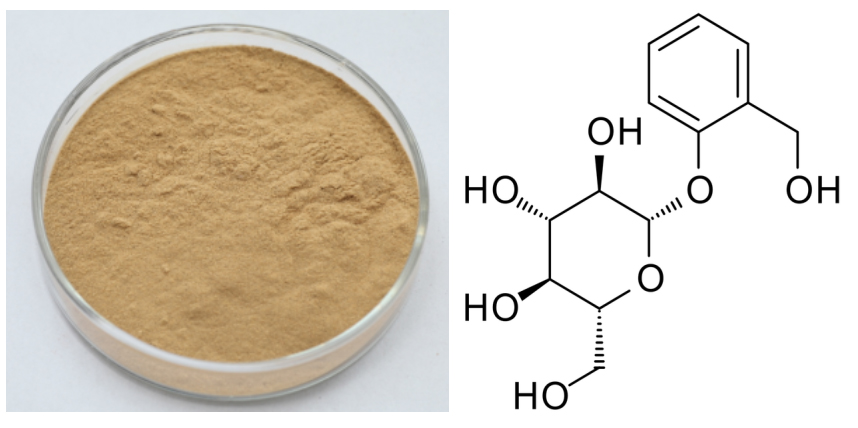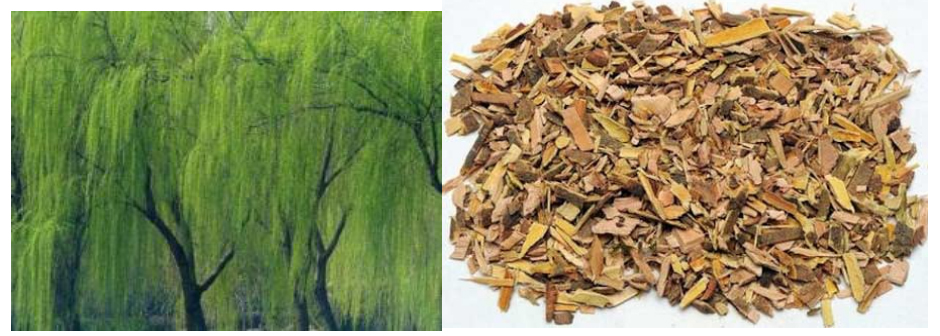Online Manufacturer for White Willow Bark Extract Supply to Spain
Online Manufacturer for White Willow Bark Extract Supply to Spain Detail:
[Latin Name] Salix alba L.
[Plant Source] from China
[Specifications] Salicin 15-98%
[Appearance] Yellow Brown to White powder
Plant Part Used: Bark
[Particle size] 80 Mesh
[Loss on drying] ≤5.0%
[Heavy Metal] ≤10PPM
[Storage] Store in cool & dry area, keep away from the direct light and heat.
[Shelf life] 24 Months
[Package] Packed in paper-drums and two plastic-bags inside.
[Net weight] 25kgs/drum
Brief Introduction
Salicin is a naturally occurring compound found in the bark of several species of trees, primarily North American in origin, that are from the willow, poplar, and aspen families. White willow, from whose Latin name, Salix alba, the term salicin is derived, is the most well known source of this compound, but it is found in a number of other trees, shrubs, and herbaceous plants as well being synthesized commercially. It is a member of the glucoside family of chemicals and is used as an analgesic and antipyretic. Salicin is used as a precursor for the synthesis of salicylic acid and acetylsalicylic acid, commonly known as aspirin.
A colorless, crystalline solid in its pure form, salicin has the chemical formula C13H18O7. Part of its chemical structure is equivalent to the sugar glucose, meaning it is classified as a glucoside. It is soluble, but not strongly so, in water and alcolhol. Salicin has a bitter taste and is a natural analgesic and antipyretic, or fever reducer. In large quantities, it can be toxic, and overdoses may lead to liver and kidney damage. In its raw form, it may be mildly irritating to skin, respiratory organs, and eyes.
Function
1. Salicin is used to ease pain and reduce inflammation.
2. Relieve acute and chronic pain, including headache, back and neck pain, muscle aches, and menstrual cramps; Control arthritis discomforts.
3. Relieve acute and chronic pain.
4. It has the same effect on the body as aspirin without any of the side effects.
5. It is an anti-inflammatory, a fever reducer, an analgesic, an anti-rheumatic, and an astringent. Specifically, it helps to relieve headaches.
Application
1.Anti-inflammatory, anti-rheumatic,
2.Reduce a fever,
3.Use as an analgesic and astringent,
4.Relieve headache,
5.Ease pain caused by rheumatism, arthritis, and carpal tunnel syndrome.
Product detail pictures:

Related Product Guide:
We'll make every effort and hard work being outstanding and excellent, and speed up our techniques for standing during the rank of global top-grade and high-tech enterprises for Online Manufacturer for White Willow Bark Extract Supply to Spain , The product will supply to all over the world, such as: Danish, Italy, Bangladesh, We will supply much better products with diversified designs and professional services. We sincerely welcome friends from over the world to visit our company and cooperate with us on the basis of long-term and mutual benefits.
Please share this video far and wide to help heal the suffering. Thank You.
MORE INFO AT WWW.MARKJAMESGORDON.COM Order consults, JIvana Detox-All Tea, and herbs.
QUESTIONS? mark@markjamesgordon.com
Reishi Mushroom (aka Ganoderma, Ling Zhi, or Mannentake)
REISHI AND HIV
Called “the mushroom of immortalty” Reishi is one of the top medicinal plants in the Chinese herbal system.
Non-Toxic –
Reishi is non-toxic when used appropriately and can be taken daily on a long-term basis with few known side effects.
Interference with the effectiveness of some drugs (especially immunosuppressants) is possible.
It’s always a good idea to consult a qualified health physician (preferably someone with experience in complementary health care) before consuming any dietary supplement. This is not medical advice.
The “Great Protector”
Reishi is also known as the “Great Protector” because of it’s well documented ability to strengthen the immune system .
Active Components – Beta-glucan polysaccharides and triterpenes:
The active components of Reishi include both beta-glucan polysaccharides and triterpenes in the form of Ganodermic Acid.
The fruiting body (above-ground part) and mycelium (filaments connecting a group of mushrooms) are used as medicine. It’s now being shown that that mushroom spores contain up to 70 times more of these active constituents.
Increases T-Cells
As Dr. Andrew Weil writes, Reishi “has been the subject of a surprising amount of scientific research in Asia and the West.” Research shows that the polysaccharide beta-d-glucan in Reishi boosts the immune system by raising the amount of immune-boosting T-cells. HIV, the virus responsible for causing AIDS, attacks the immune system, specifically targeting these T-cells, reducing the body’s ability to fight infection. By stimulating them, Reishi strenghtens the immune system’s ability to combat AIDS and other diseases.
Anti-Viral
It’s also known for it’s anti-viral properties and studies indicate that Reishi inhibits the HIV-1 PR enzyme.
Now Being Used In the West
Western medicine is starting to embrace Reishi where it’s currently being used as an immune stimulant by patients with HIV according to the Memorial Sloan-Kettering Cancer Center. WEbMD and other well-known medical websites also list Reishi as a treatment for HIV/AIDS.
https://www.mskcc.org/cancer-care/herb/reishi-mushroom
https://www.webmd.com/vitamins-supplements/ingredientmono-905-REISHI%20MUSHROOM.aspx?activeIngredientId=905&activeIngredientName=REISHI%20MUSHROOM
An Approved Cancer Drug in Japan
Reishi contains over 400 bioactive components and is an approved cancer drug in Japan.
Interlukins, Glucans, and Canthaxanthin
They evidently recognize it’s abiltiy to stimulate interlukins which combat tumors, as well as it’s immune enhancing properties. Studies also show that the “glucans” in Reishi help immune cells bind to tumor cells. Another substance in Reishi called “canthaxanthin” slows down the growth of tumors according to “The Prescription for Dietary Wellness” by Phyllis A. Balch and other experts.
Red vs Black Reishi
Please note that Black Reishi is also used as a medicinal herb but is not as potent as the red variety due to it’s lower polysaccharide levels.
The “Medicine of Kings”
With all these benefits, Reishi is truly “the medicine of Kings.”
US National Library of Medicine
Numerous medical journals published in the US National Library of Medicine have shown Reishi mushroom to be effective.
Cancer Research UK (CRC), the City of Hope National Medical Center in California and the Memorial Sloan-Kettering Cancer Center
Health institutions such as the Cancer Research UK (CRC), the City of Hope National Medical Center in California and the Memorial Sloan-Kettering Cancer Center are now pursuing researches and studies on Reishi mushrooms.
Toyama Medical and Pharmaceutical Universit
A study in Japan at the Toyama Medical and Pharmaceutical University indicated that “Ganodermic” compounds in Reishi were “found to be active as anti-HIV-1 agents.”
https://www.sciencedirect.com/science/article/pii/S0031942298002544
https://www.reishi.com/sites/default/files/Inhibitory%20Effects%20of%20Components%20from%20Ganoderma%20lucidum.pdf
October 1998 issue of Chemical and Pharmaceutical Bulletin
Another study published in the October 1998 issue of Chemical and Pharmaceutical Bulletin, found that triterpene compounds, found in the reishi mushroom and it’s spores significantly inhibit anti-HIV activity.
https://ukpmc.ac.uk/abstract/MED/9810695/reload=0;jsessionid=WfvhjwRusm9T5m1QmJno.0
Nothing on this web site should be construed as an attempt to offer or render a medical opinion or otherwise engage in the practice of medicine.
Goods just received, we are very satisfied, a very good supplier, hope to make persistent efforts to do better.







